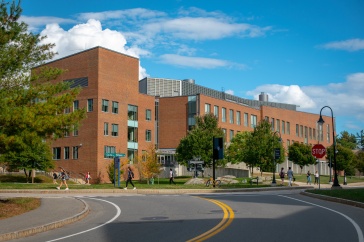
A UNH researcher will work to advance our understanding of chemical changes in RNA molecules and train STEM workforce in innovative RNA technologies, thanks to a major new grant from the National Science Foundation.
Harish Vashisth, professor of chemical engineering and bioengineering at the University of New Hampshire, has been awarded $780,000 to investigate the role of chemical modifications in transfer RNA (tRNA) molecules. The findings could shed light on the molecular basis of misfolding in tRNA and identify new therapeutic applications and treatments for neurodegenerative diseases.
“I am deeply grateful to NSF for continuing to support our innovative research in biophysics of RNA molecules, says Vashisth, who is joined by collaborator Esteban Orellana, assistant professor at Dartmouth College’s Geisel School of Medicine. “Collaborations between faculty in UNH’s Department of Chemical Engineering and Bioengineering, and biomedical researchers at Dartmouth College truly exemplify unique collaborative research environment at New Hampshire universities.”
tRNAs play a crucial role in protein production by delivering amino acids to ribosomes, the cell’s protein-making machinery. These molecules undergo chemical modifications in response to environmental changes, developmental stages, and differences among cell types. Vashisth’s research will use theoretical and computational chemistry, biophysics, and biological chemistry to examine how such modifications affect tRNA behavior.
Beyond scientific discovery, the project also aims to broaden the impact of RNA education and workforce development. With RNA-based technologies rapidly expanding—from mRNA vaccines to novel therapies—the grant will support outreach efforts to integrate RNA science into K–12 and STEM education. By introducing more students to the principles of RNA structure and function, the project hopes to inspire the next generation of engineers and scientists in biotechnology and biomanufacturing.
The project, titled Collaborative Research: Probing the role of chemical modifications on structure, folding, and dynamics of tRNA isodecoders, exemplifies UNH’s commitment to advancing innovative research while preparing students to lead in emerging areas of science and technology.
-
Written By:
Brooks Payette | College of Engineering and Physical Sciences

















































